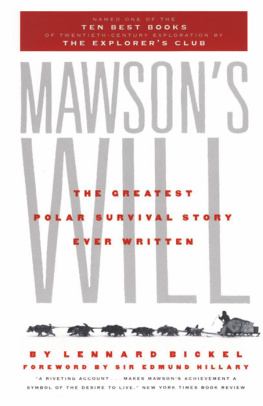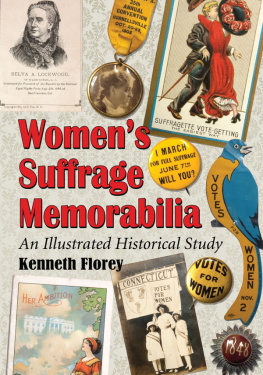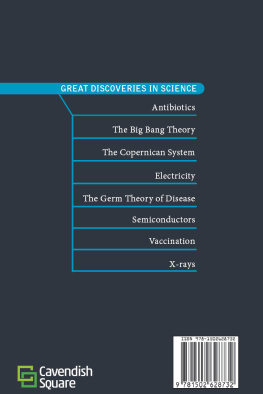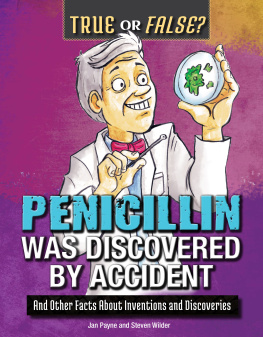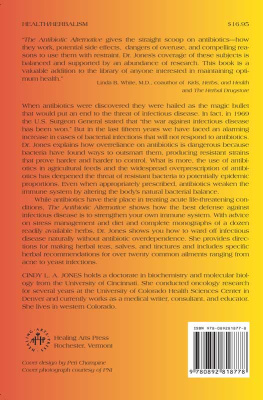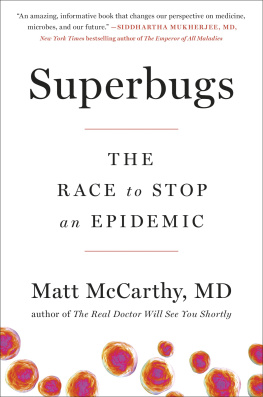Florey
The Man Who Made
Penicillin
Lennard Bickel

TO: THE OXFORD TEAM
Contents
This book is the story of a man whose life and work affected the welfare of the whole world. The idea for the book began when a cleaning lady, who also made the tea, at the John Curtin School of Medical Research in Canberra, gave her last two dollars as the first contribution to a memorial fund when she heard that the people to whom she served the tea were planning to honour Lord Florey. I knew he was the man who saved my life because he made penicillin work. But he was also very human and warm, and a great man, so I gave him my last two dollars, until next pay day. Miss Emma Burkervisc was a displaced person from Latvia who spent six years in a camp in Germany after the Second World War. During those years penicillin was used to save her life. On a visit to the John Curtin centre in 1966, Florey spoke to Miss Burkervisc as she stood with her mop and bucket in a corridor.
This book is written for her and others like her around the world who did not know the man to whom they owe their lives. It is not a work of reference, but the story of a man and what he did. There is no bibliography because the literature on penicillin and the resultant antibioticsother than the first historical papers referred to in the textis too voluminous to be manageable and is continually expanding.
The accomplishment of this story is owed to the goodwill and kindness of people in three continents, as well as to the co-operation and support of many organizations and individuals; they are so numerous that recognition of every one is impracticable in these pages. The debt to them all is profound; but there are special people whose names must be mentioned in gratitude since, without their goodwill, the story of Howard Florey could not be told.
Acknowledgment is especially due to Lady Margaret Florey, for trust and immense kindness; to Floreys only daughter, Mrs John McMichael and her husband in Edinburgh; his son, Dr Charles D. V. Florey; and to those members of the inner circle of the Oxford team who have not been blessed enough for what they achievedDr Norman G. Heatley, for his friendship, advice and unlimited patience; Professor Sir Ernst Chain, of Imperial College, London, for guidance and insight; Professor E. P. Abraham, the author of Floreys memorial in the Proceedings of the Royal Society; Dr Gordon Sanders and those of the staff at the Dunn School who provided intimate pictures of Florey the man and the scientist. Not least is acknowledgment of debt to be made to Floreys long-term friend, Professor Robert Webb, and to the boy of fourteen who became his man for lifeJames Kent.
Special debts are owed to Lord Adrian and Sir Alan Drury of Cambridge; to Lord Carrington and the late Sir Lawrence Bragg; to Professor Brian Maegraith of Liverpool; especially to Dr C. M. Fletcher of London, along with Dr J. M. Barnes; and to the great kindness of Professor H. H. Harris; Dr P. L. Bazeley; Dr Dennis Bodenham; as well as to the late Professor Sir Harold Raistrick; and to Professor R. J. V. Pulvertaft of Dorset; and Dr E. N. C. Crawford of Magdalen College, Oxford.
Acknowledgment is here made to officers of the Medical Research Council, and help was forthcoming from the staff of the Royal Society, as well as from many librariansespecially Mr M. W. Davies of the Royal Army Medical College, Millbank. The list is extensive and applies to many sources throughout America, Australia and Europe. In Stockholm, the Nobelstiftelsen, through Mme Ehren, gave every help. In the United States, officials in charge of the nations archives, the Army Medical History group, the Surgeon Generals office, plus executives and scientists in some of the leading drug houses made valuable contributions.
Among the American pioneers of penicillin, the spirit to assist with this book was unstinted; my thanks go especially to Dr Robert Coghill, formerly of the Northern Regional Research Laboratories, at Peoria, Illinois, USA, and to other officers there, including Dr Dwight Miller for generous help; Dr Wallace Herrell, who worked in the Mayo Clinic; Dr Gladys Hobby of the first penicillin team in New York; Dr Max Tishler; Dr William Gibson of Vancouver; Dr Lewis H. Sarett; Dr Vannevar Bush; and Mrs John Fulton of New Haven in particular. These are among the many people who have given generously of time and memory.
The confused German story, in the appendix of this book, could not have been unravelled without the efforts of scientists with the Bayerwerken laboratories at Leverkusen, the help of Professor Bernhauer, Dr Heinz ppinger and officials of the German Federal Republic archives services, specifically Dr Zoske in Freiburg. The help of the Australian embassy in Bonn was invaluable.
The list in Australia is no less lengthy and thanks are due to Floreys niece, Dr Joan Gardner, his sister-in-law Mrs Emmeline Brebner and his lifelong friend, Mrs Molly Bowen of Adelaide. I am also indebted to Sir Robert Menzies; the Rt. Hon. John Gorton; Sir Marcus Oliphant, now Governor of South Australia; to Professors R. D. Wright of Melbourne; G. M. Badger of Adelaide; Frank Fenner of the John Curtin School; Bede Morris of the same institution; G. J. V. Nossal and David Grey of Melbourne; and no less to Sir Macfarlane Burnet; the late Sir Douglas Copland; Sir John Crawford, Vice-Chancellor of the Australian National University, as well as the Chancellor, Dr H. C. Coombs. Sir Roland Wilson and Sir Hugh Ennor must be thanked along with Mr and Mrs Robert Edwards of Adelaide; Mr Neville Whiffen of Abbots, Kurnell; especially Mrs Pauline Fanning of the National Library of Australia and those many librarians and officers of different organizations and pharmaceutical houses whose research was crucial. My thanks also go to my own wife, Pauline, without whose application this work would not have been completed.
The confidence and support of the Commonwealth Literary Board, Australia, were also necessary to the pursuit of the research and completion of the work. To all these, I express my appreciation.
LENNARD BICKEL
London, January 1972
There had been heavy rain during the night and the February day dawned in mist across the sodden Oxfordshire countryside, slate-grey with the cold of midwinter. When he woke he felt too ill and too depressed to go to the laboratory and so he whiled the morning away.
For sixteen years he had carried a time-bomb in his breast, and after lunch on that last day it exploded. The coronary was massive and left him no chance of recovery. The borrowed time on which he had lived for so long had run out. He sank into coma and in the evening his heart ceased to beat and the lines of pain and long life eased from his face.
The end came to Lord Florey in his rooms at the Provosts Lodgings in Oxfords stately Queens College, on the opposite side of the world from South Australia where he had been born, beneath the corrugated iron roof of a rough stone cottagesixty-nine years earlier, the only son of a migrant bootmaker.
Howard Walter Florey died a revered statesman of science, a peer of the British realm, an immediate past-President of the Royal Society, Chancellor of the Australian National University, Nobel Laureate, holder of hundreds of awards, medals, degrees and distinctions, and the man who had bequeathed penicillin to the world.
In the last thirty years of his life, the three decades spanning the middle of this century, he had been the epicentre of a medical revolutionmarked by furious drive, imagination and initiativewhich had opened a golden age of healing in the midst of the most violent war in history; and while he had not been directly motivated by a crusading spirit to relieve human suffering but rather by a direct scientific challenge to intellect, he had opened the floodgates to the title of substances from the astonishing micro-world from which was drawn the armament of the antibiotic age.


